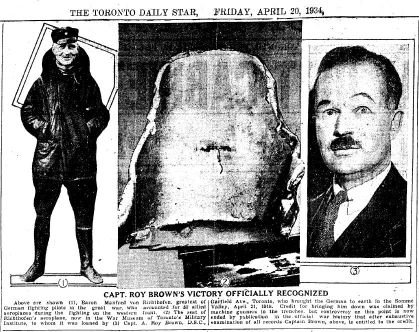Official Recognition 1934
TORONTO MAN BROUGHT DOWN RICHTHOFEN, HISTORIAN SAYS:
"Official Volume Recognizes Capt. Roy Brown as Conqueror of German Ace
Official recognition of a feat that on April 21, 1918, excited the attention of the whole world has just been given Capt A. Roy Brown. Garfield Ave. Toronto, who on the above date in an epic duel in the air shot down Baron Manfred von Richthofen, greatest of all German fighting pilots. The official reconition is referred to in Volume IV, "The War In The Air", which is part of the "History of the Great War", by H. A. Jones, that is based on official documents by direction of the historical section of the committee of imperial defense. After describing Richthofen's last flight and fall on the Somme on April 21, the official volume states, when dealing with the question as to who should be officially recognized as his conqueror: "In an attempt to resolve var-out claims at the outset, the body of the dead pilot was examined by four medical officers and their reports showed that Richthofen was struck by one bullet only, which entered the right side of the chest and issued at the left side, at a level two inches higher than the entrance. There was evidence that the bullet had been deflected from the spine, but on this point the medical reports are not in agreement. The gun firing the bullet, said the reports, must have been situated roughly in the same plane as the long axis of the German aircraft and fired from the right, and the medical officers were agreed that the entrance and exit wounds were such that they could not have been caused by a bullet fired from the ground. After a careful examination of these and of all other reports, the official decision was that Richthofen was killed by a bullet from the machine gun of Capt. A. Roy Brown.
Not Particularly Interested
"No, I am not particularly interested now," said Capt A. Roy Brown to The Star, when the reporter informed him of this official recognition of which he knew nothing. "You see, my whole interest today is taken up with my business as director and sales manager of the Imperial Varnish and Color Co. Ltd. and with my directorate of GeneralAirways Ltd."
The reporter found Capt. Brown in the offices of the latter concern late in the evening. "Besides I could not really fly in those days. I was never taught to fly in the army," he continued. "I knew how to take off from the ground and get down again and I could throw a machine around in the sky. That was all, the rest I picked up in the school of experience." "Our pilots might not have flown so well from a war standpoint if they had had a lot of flying knowledge," he continued. "The factors I believe that made most for success were a quality of what might be described as foolhardy recklessness and the ability to make instant decisions." Since the pilot's guns are fixed and shoot through the the blades of the rotating propeller, Captain Brown explained that success in air combat depended entirely on the ability of a pilot in bringing the nose of the aeroplane into such a position that the fire of the guns would be effective on the enemy machine.
Doubt Flier's War Effectiveness
Readily acknowledging that commercial aviation had made tremendous advances in the post-war years, Captain Brown doubted whether the great flock of to-day's commercial airmen would be particularly effective should another great war suddenly materialize. "The whole training of the commercial pilot is one of caution and safety first," he said, "while a fighting pilot to be successful needs recklessness, rapid action and decision and an utter disregard of many of those qualities that make for success in commercial work." "The machines and their handling in the two departments of flying differ totally. The one man cannot do the other's job. Witness, for instance, the results when United States army pilots endevoured to carry the air mails. I think there would have been even greater disaster if a group of commercially trained men tried to tackle army fliers in a 'dog fight'."
Richthofen's conqueror is still a young man. Since the war days he has married and is the proud father of a family of three, two girls, aged 13 and 12, and a son, Donald, aged 7, who looks as though he has inherited a goodly share of the qualities that made his father famous. "My business is my interest now." concluded Captain Brown, "I am chiefly concerned in making a success of it."
Originally published on Friday, April 20, 1934 - Toronto Daily Star
PDF Scan of original newspaper page_1
PDF Scan of original newspaper page_2
